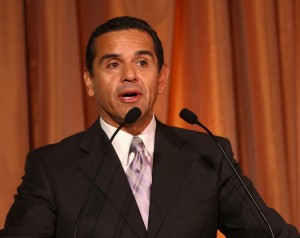The Bureau of Sanitation for the City of Los Angeles falls under the authority of Mayor Anthony Villaraigosa. Clearly he knows that the “Bureau” is pushing a draconian city-wide ban on all paper and plastic bags at grocery and convenience stores. As he should, of course — he should know everything of significance that takes place under his watch of the city. Pushing outrageous public policy items like this without his consent would be very significant and disturbing. The extremist agenda at the Bureau of Sanitation apparently is to heap more regulation on thousands of retail stores trying to turn a profit and employ people in an already over-regulated city inside of an insanely over-regulated state. The Bureau’s proposal is to ban paper and plastic shipping bags at grocery and convenience stores, and force every Los Angeles resident to buy reusable bags at the store every time they shop (or I guess keep them in their cars to whip out when they happen to go to the store). But the Bureau does not have the unilateral authority to enact such a ban. That can only be done by the City Council.
I am not making this up — the tail is, in fact, wagging the dog here as the Bureau of Sanitation is pushing a policy that the Los Angeles City Council is current reviewing and deliberating. Does this seem backwards to you? Isn’t the council supposed to first adopt a policy, then the bureaucrats work to implement it? Not the other way around? It is up to the City Council, not city bureaucrats, to determine whether to restrict the freedom of residents and threaten local jobs by imposing a ban on paper and plastic bags.
The folks at the Bureau are working hard to gin up the public — presumably to apply more pressure to the council to pass the ban. They have literally thrown caution to the wind – and are producing materials to lobby the public and City Council alike as to why this bag ban is good, sound public policy. The problem is that the information that they are producing is filled with lies and distortions. The question is whether the Mayor knows that they are doing this, and does he allow them to do so with his blessing?
Case in point is some official literature, produced by the Bureau of Sanitation and distributed all around L.A., which you can see here. Most recently and specifically, it was handed out at a town hall meeting in Van Nuys about a week ago — which is how it got on my radar screen.
The organization Bag The Ban has put out a flyer that totally debunks much of the propaganda handed out by the Mayor’s sanitation minions. You can check it out here. Below are just a few examples I pulled from it (though the original includes these and more rebuttals – all with citations).
The L.A. Sanitation Bureau asserts: “14% of roadside litter is paper and over 30% is plastic.”
Fact-Check: The Bureau provides no cited source for this data. While general plastic may represent a significant portion of roadside litter, seven recent litter studies from around the country demonstrate that, on average, plastic retail bags make up only 1-2% of litter. In fact, San Francisco reported plastic bags to be only .6% of litter before the City implemented a plastic bag ban; a year after the ban, plastic bag litter was actually reported to be .6%. In reality, plastic retail bags account for less than 0.5 percent of the U.S. municipal solid waste stream.
The L.A. Sanitation Bureau asserts: “Approximately 12 million barrels of oil go into the US supply of plastic bags.”
Fact-Check: This claim is 100% FALSE. The Fact Sheet does not provide a reference and the ultimate meaning of the claim is unclear, but it implies that petroleum oil is used to manufacture plastic bags, which is not the case. In the U.S., 85 percent of the raw material used to make plastic bags is produced from domestic natural gas. On the other hand, most reusable bags are made in China from non-woven polypropylene – an oil-based material that cannot be recycled.
The L.A. Sanitation Bureau asserts: “Only 5% of the 2.3 billion plastic bags used in the City each year are recycled.”
Fact-Check: This claim is not sourced. However, in another “FAQ” document, the Bureau maintains that the data is based on “Bureau of Sanitation estimates” derived from information contained in a 2007 staff report to the Los Angeles County Board of Supervisors. An “estimate” derived from five year-old data in an LA County report is hardly reliable. According to the EPA, the recycling rate of polyethylene bags, sacks and wraps in 2010 was 14.7%, a 23.8% increase from the rate in 2009. Recycling of polyethylene bags, sacks and wraps has now grown in 9 out of the last 10 years. Additionally, more than 90 percent of Americans report reusing their plastic bags at least once, for everything from storage to waste disposal to packing material. Ban proponents conveniently ignore the high reuse rate of plastic bags when they (falsely) criticize their recycling rate.
If I am a member of the Los Angeles City Council, I would be pretty upset right now. First and foremost at the hubris of the folks at the City’s Sanitation Bureau going out and promoting a policy to the public, in essence urging the public to put pressure on the City Council. City departments should be getting their queue from policy-makers, not putting them in the cross-hairs. The second reason I would be upset would be that clearly false and deceptive information is being put in front of the Council to try to achieve an outcome. The City Council of Los Angeles is dominated by liberal politicians who might be inclined to ban paper and plastic bags just to flex their big government tendencies. But every once in a while even a left-of-center politician will make the right decision – if they have the correct information in front of them.
On a closing note, one wonders if Mayor Villaraigosa is going to do anything about this. I’m going to give him the benefit of the doubt and assume the Mayor is not aware of this misinformation campaign coming out of a Bureau that is under his control. Assuming that is the case, Villaraigosa still must take responsibility for it. He should apologize to his council colleagues for this kind of behavior from Bureau employees under his supervision. And then begin a realistic dialogue about whether this kind of ban serves well the residents of Los Angeles.



